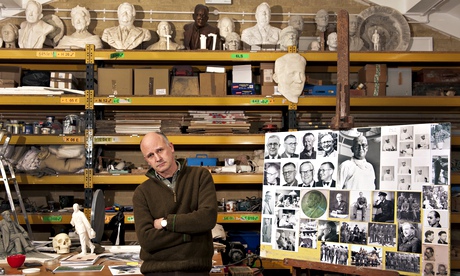
A memorial to the pioneering plastic surgeon who invented techniques that transformed the lives of mutilated survivors of second world war air crashes, has been unveiled by the Princess Royal.
The statue of Sir Archibald McIndoe, paid for by public subscription, is in East Grinstead – the west Sussex town that became known as "the town that did not stare" as his bandaged patients marched determinedly out to concerts and dances. McIndoe called them the Guinea Pigs because so many of his repair techniques had never been tried before.
By a strange coincidence, unknown when the statue was commissioned, sculptor Martin Jennings's father Michael was one of McIndoe's patients.
Jennings, whose recent commissions include the poet John Betjeman at St Pancras station, and Charles Dickens near his Portsmouth birthplace, first saw his father's medical records when he went to discuss the project with Jacquie Pinney, chief executive of the Blond McIndoe Research Foundation, which continues McIndoe's work. Like many of McIndoe's patients, Michael Jennings thought his life was in effect over even though he had survived, burned beyond recognition when he went back into a blazing tank to get medication for his injured men. After years of treatment, he went on to marry, have a career and father 11 childen.
By the end of the war there were 649 Canadian, Australian, New Zealand, US, French, Russian, Czech and Polish Guinea Pigs.
Jack Perry, a young airman who suffered horrific burns when his Halifax bomber caught fire in 1944, is now, at 88, one of the last surviving Guinea Pigs. He vividly remembers waking up in a hospital bed in Lincolnshire to find McIndoe sitting on his bed.
"I loved all sports and I had been lying there thinking I would never play anything again. It was the end of my world," he said.
The statue shows McIndoe with his hands reassuringly on a patient's shoulders: his former patients remembered the strength of his assurance that they would recover.
Aircraft fires typically left their victims with fingers scorched into a melted clump of blobs. Perry recalled: "McIndoe took my hands in his and promised: 'You will play again, I'm telling you now, you will play again.'" Perry – who described his injuries as "not too bad, I had 80% burns, there were others with 100%" – was one of the casualties, McIndoe gathered up on regular expeditions around the country and brought back to East Grinstead. He went on to make a career in the atomic energy industry and did indeed play sports again, including golf with a respectable handicap.
The physiotherapy after the surgery was also pioneering: Perry remembers one exercise just after the war, when fruit was scarce, which involved squashing an orange in the hand – if the grip was hard enough to split the fruit, the patient could keep it.
The Guinea Pigs met every year in East Grinstead and in their glory days were a raucous bunch. Famous entertainers often came to their annual reunions, including Max Bygraves, who launched into his latest hit, You Need Hands. He was in full swing when one of the Pigs took off his artifical hand and threw it across the floor at the singer. Bygraves came back the next year and offered to perform You Need Hands again, but only on condition there were no more flying body parts.
The statue has been sited outside the town's historic Sackville College, which McIndoe passed every day on his journey to work.
"He was a wonderful man with a wonderful team – I owe him everything," Perry said.

